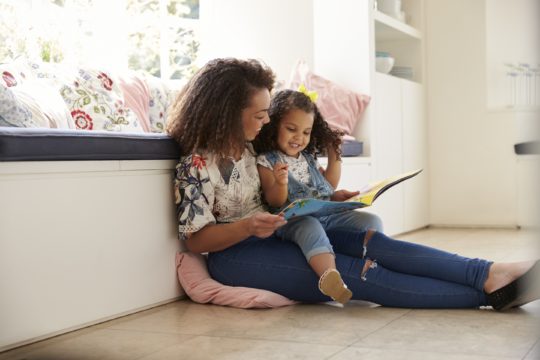All parents want to be able to talk to their children about anything. If your school-aged children are having difficulty at school or with friends, or when it comes time for ‘the talk’ with your teens, having a relationship founded on strong communication will make these tough conversations easier. The best way to prepare for these conversations early is to build this communicative relationship early. This Parenting Tip of the Week is all about giving you some concrete steps to start building these communication skills with your toddler.

The Importance of Praise
Praise, or showing positive attention to your child after they do something good, is critical to a strong relationship. This is true for several reasons. First, when you praise your child’s good behavior, your child will do those behaviors more often. Second, praise helps build your child’s self-esteem, makes them feel good and helps young children see their parents as a source of happiness and good feelings.
According to the experts at the CDC, when praising your child it’s best to use labeled praise. This type of praise refers to specifically mentioning to your child what it is exactly that you liked about their behavior. Some examples of labeled praise include:
- “You did a great job cleaning up after playtime!”
- “I’m so proud of you for sharing toys with your sister!”
- “Nice job being so quiet in church today!”
The Power of Active Listening
Hearing and listening are two very different things. You can help build a strong relationship with your child by giving them your full attention when they are sharing something with you. When children know that you are interested in what they have to say, they are more willing to share more with you, now and in the future.
You can show your child that you are actively listening to them in several ways.
- First, stop what you’re doing and make eye contact. This can be challenging if your child has chosen to start a conversation when you’re in the middle of something like a chore, but remind yourself that the dishes will still be there when your child is done talking!
- When your child shares something with you, summarize and repeat it back to them. Not only does this show you’re listening, but it also tells your children that you understood what they wanted to tell you. This is called reflection.
- Validate their feelings. If your child is excited, be excited along with them! If they’re sad, tell them that you’re there for them. Make sure to label feelings, as this helps your child learn what their feelings are and how to cope with them in the future.
Remember, praise and active listening are but two ways that you can build a strong relationship with your child. For more information and ideas about ways to practice good communication with your child, watch this video from the CDC.
What have you done to build a strong and communicative relationship with your child? Let us know by tweeting us @PCAAmerica or by leaving a comment on our Facebook page!





